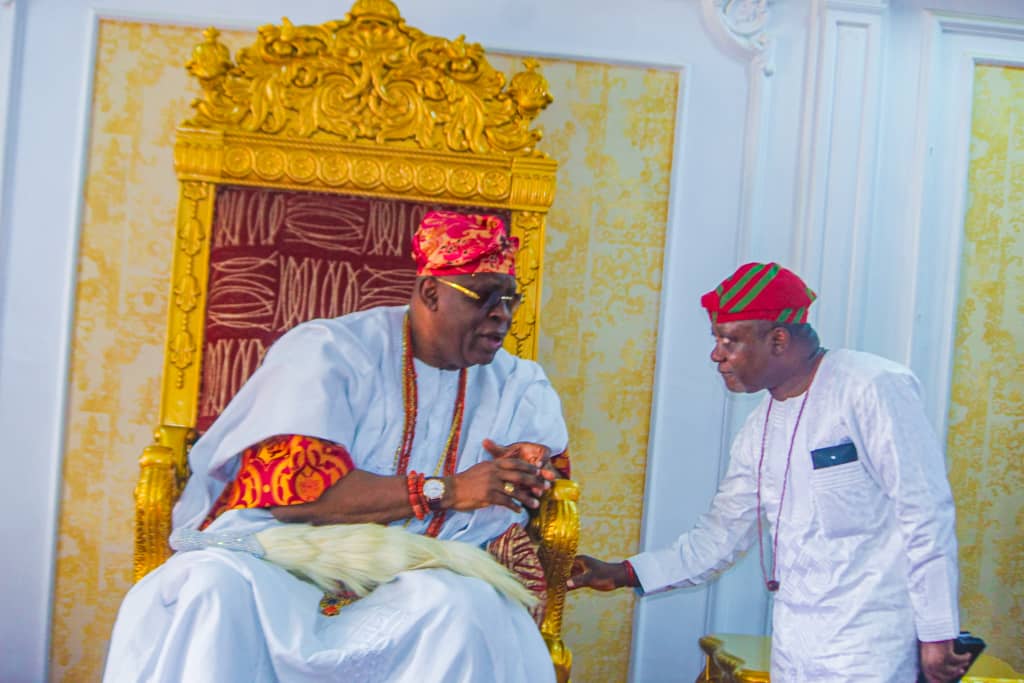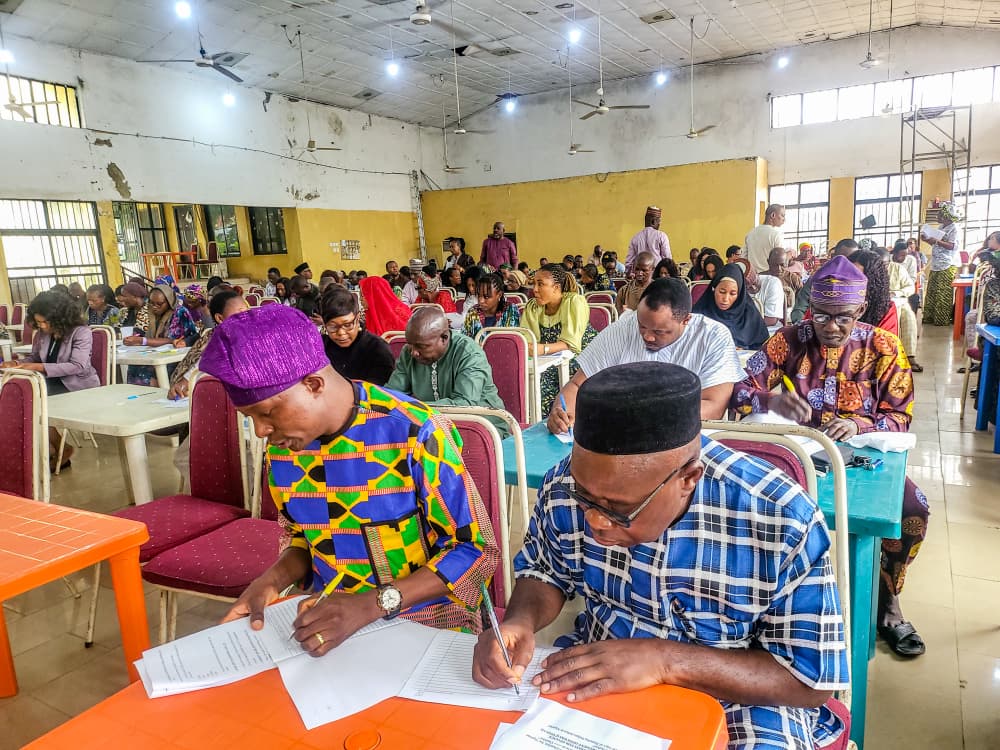A Speech Delivered by DR. DIPO KALEJAIYE at the OLOKUN FESTIVAL At the Palace Square of His Royal Majesty, The Monarch of Onigbongbo in Ikeja Lagos, Oba Yususf Olatunji
Good morning your Royal Highness, Oba Yusuf Olatunji, traditional rulers, chiefs, members of the Oodua People’s Congress, and other distinguished ladies and gentlemen. This speech is supposed to be about aje the Yoruba concept of wealth creation. I am happy to note in my letter of invitation that the letter heading reads this way Wealth Festival and in Yoruba language Odun Aje. Importantly, this festival is also taking place on a Monday, traditionally within the Yoruba calendar, Monday is a day referred to as ‘ojo aje’ – the day for making wealth and reaping profits. In musing about this concept, it dawns on me that the concept of ‘Odun’ within the realm of Yoruba religion and philosophy is likely to refer to the worship and veneration of Yoruba gods and goddesses. Hence, we hear about Odun Ifa the festival of Ifa referring to Orunmila the Yoruba god of divination, Odun Ogun the festival of the Yoruba god of Iron, war, blacksmiths, and hunters, Odun Sango the festival for the god of thunder and lightning, Odun Oya the festival for the goddess of the sea, and Odun Aje the festival for the veneration and worship of the goddess Aje, who is the guardian goddess for wealth, profit, wealth creation and sustenance among the Yoruba race. If an individual wants to be wealthy the physical things he or she must engage in are quite apparent. For example, a trader at Oshodi market must get a shop and decide upon what to sell in the shop. Similarly, a carpenter finds a spot for his carpentry work, also a street trader who sells bread, koko, oranges, and the like, must find a route for advertising this products. These are summary examples of the physical aspect of ordinary trading.
The crux of my discussion today is that religion permeates all facets of traditional Yoruba life, that Aje in traditional Yoruba religion is a goddess and therefore must be venerated. Also, that an individual’s effort towards amassing wealth is only physical and that the spiritual aspect of Yoruba life is the guiding force for seeking physical wealth. I will also posit that without understanding the spiritual the person trying to be wealthy through the physical I have mentioned is likely to miss the point of wealth creation.
Aje is responsible for profit making in the market place, and in fact, supervises the entire aspects of life that relates to money. It behoves us to note the special place of this goddess in the traditional economy of the Yoruba race as it centres on the open air market place of old which of course still exists today. The relationship between Yoruba traditional religion and Aje will not be complete if I do not take time to explain how Aje came into the Yoruba cosmos. As the oral tradition goes, Riri was looking for a child and she was moved into tears about this because she had been looking for a child for a very long time and was unable to conceive and bear a child. Finally, she decided to go to a Bababalawo a guardian of the Ifa oracle and a father of divination. 
The babalawo consulted the Ifa oracle and the oracle prescribed a sacrifice to Orunmila, the progenitor of Ifa. Orunmila. Riri was asked to offer the following items as sacrifice to Orunmila – two fish, two hens, and two goats. Orunmila was pleased with the sacrifice and Riri became pregnant. She gave birth to three children namely: Oja- the Yoruba open air market, Ona – the Yoruba Street, and Ile – the ground. One day, Riri wanted to ease herself and asked Oja if she could allow her to ease herself in the market. Oja refused by saying that the market is for trading and she could not allow Riri to defecate anywhere in the market. Riri then turned to Ona with the same request and Ona turned her down saying that the street is not a place for Riri to defecate.
Finally she asked Ile if she could ease herself and Ile gave her permission to ease herself since Ile owned every inch of the ground or earth. When Riri defecated on the ground it was wealth, profit, and essentially, money that came out. The wealth, profit and money became a spirit Aje and she entered the ground. Anytime anyone wanted to make profit in commerce, or wanted to become rich it was the spirit Aje that the person must call upon. It is the belief of the Yoruba that Aje enters the market unannounced and goes to the stall of whomever she wants hence the Yoruba saying “Aje a wo ‘gba”. That is, “May profit enter your business.” Also the saying “Aje arin gini gini w’oja” is common among the Yoruba.This phrase merely refers to the quiet unannounced way in which the spirit ‘Aje’ enters the Yoruba market.If Aje enters one’s business then one will make a profit. Imagine if Aje was to reside permanently in one’s commercial business venture. That individual will become a wealthy man and Aje will receive the accolades, Even the phrase “omo alaje ni” which means this person has the benevolence of aje is a common phrase among the Yoruba.
What is the Oriki (or praise names) of Aje: I will render it in Yoruba:
Aje ogungunniso
Arin gini gini w’oja
Olupese Oro Owinrinkinsisi
Olokun Semi Ade
Elegbeje Ado
Bukusa Oro
Alukubeli ti deru bosi
Odudun asode dero
Aje je ki nni o lowo
Aje osu na asebi
Aje ti so eru d’omo
Oosa ni we iya okin
Aje nii weri omo
Onipasan owere
Aje dakun ma na mi ni pasan re ko se naani
A na omo na yeye
Pasan re ko se na ni
Aje nii so ewe dagba
Kos i Oosa taa deyin aje se
Je ki n ri ona
Je ki nri o mulo lati se gbogbo nkan ti no fe se
Ki nri n muse ohun rere
Owo yeri yero okin
Aje o o pomo b’imo oro.
At this junction it is important that I begin to relate Aje to the concept of Yoruba traditional religion that I mentioned earlier. In order to proper venerate Aje one must start from a very elemental point of view. Yoruba traditional religion is not merely the worship of various gods and goddesses; it is a way of life which encompasses all facets of being. The worship of Orunmila or consulting Ifa, the oracle of Orunmila, is at the very basis of this religion. Orunmila with its attendant two hundred and fifty six verses of the Ifa oracle touches on every aspect of Yoruba life. Definitely, out of the two hundred and fifty six verses of Ifa, there are verses concerning Aje and how to propitiate the goddess for one’s advantage in business.
We must note that the concept of trading, doing business, or selling in the local market is the province of Aje. The average individual consults the Babalawo who in turn consults the Ifa oracle on behalf of the individual. The individual’s ‘ori’ literally head, but really spiritual entity, is also consulted to see if the person is suited for business as opposed to say working in a government office.The appropriate Ifa verse will evolve to tell the person if he or she could proceed with the business plan. For example, a person may be suited for selling clothes and not food stuffs in the open air market. This is how specific Ifa could get in its conversation with Aje- the goddess of wealth, profit, and wealth sustenance. The goddess Aje is propitiated and the individual offers sacrifice as directed by Orunmila. At this point sacrifice will also be offered to Aje for a successful venture in business and trade. The emphasis here is that of destiny. The belief in the principle of pre-ordination
among the Yoruba is intrinsically related to ‘Ori’- (head).
That is, one’s fate or destiny. Are some individuals destined to be wealthy and others destined to be poor? It is the Yoruba religious and philosophical idea that whatever one would be in life has everything to do with what kind of ‘Ori’ or head the person has selected prior to appearance here on earth valid? Is this why some people are referred to as “Oloriburuku” literally meaning “one with a bad head,” that is, a person with bad luck or bad fate? Essentially, that person has picked a bad head prior to coming to this earth. Within the concept of Aje, could this goddess reverse bad luck? For example, a person with a bad ‘Ori’ might find favour with Aje and perhaps bad luck would be turned into good luck. Technically, when a Yoruba god or goddess like Aje is propitiated things should go well in the arena of business and trade. Some individuals are referred to as ‘Omo Alaje’ these are people who seem to have Aje as their patron goddess. Any business venture or trade they engage in automatically brings profit and wealth. I remember when I was only a young boy that a woman, who was my father’s tenant and who sold clothing materials at Gbagi, in Ibadan, would not touch any money early in the morning unless I take the money and give it to her. She would want me to hand the money to herso that Aje would follow her throughout the day in her clothing business at Gbagi. Any day I perform this act for her first thing in the morning before she departs for her shop at Gbagi, she would make a profit in her clothing trade.
An individual may come from Ile Aje in which case he or she would be referred to as “Omo Alaje” as I have mentioned earlier. So, at this junction, who is omo Alaje? I can only explain this idea with the following example. A woman went to the house of a Babalawo to inquire about her lot in life. Upon consulting the Ifa oracle, the Babalwo told her that she was from “Ile Aje” which means that spiritually, she was virtually given to her mother by the goddess Aje. I happen to know this woman and that when she engages in business or trade she reaps a lot of profit and money just seems to come her way all the time. The spiritual aspect I mentioned earlier is made easier for this woman because she came to life as the child of Aje, specifically from Aje’s house. So, did you ever wonder if you are ‘Omo Alaje’ or if you come from ‘Ile Aje’?On another note, I met a woman on a plane as I was travelling from Washington D.C. to Lagos. She was dressed in traditional attire and had on a head gear upon which ‘Iya Alaje of Atlanta’ was inscribed. Then I asked her to explain the meaning of the inscription on her head gear. She told me that she sells clothing materials in Atlanta Georgia in the United States where she lived and that she was the head of all Yoruba merchants in Atlanta and that she was conferred with the chieftaincy title of ‘Iya Alaje of Atlanta’! So, in faraway America Aje is recognized and incorporated into the daily life of Yoruba traders who live there.
At this point it is important to bring into focus the traditional aspects of Yoruba economy that has survived even today. In doing this, I have relied a little bit on the work of Dr. Toyin Falola, an important historian who lives and works in the United States. His book,Culture, Politics, and Money among the Yoruba,gave me useful insight into traditional Yoruba system of saving money.
ESUSU: Is a large scale cooperative among Yoruba traders and merchant of a couple of centuries back probably during the time of Alaafin Abiodun in the 18th Century. Essentially, members contribute money as if into a savings account. Members may reach about two hundred and each member must contribute into the esusu bank. There is usually a head of this cooperative and each member is required to contribute, at least, ‘one hand’ to the esusu bank. The head of the cooperative is allowed to keep aside ‘one hand’ as a safety valve against default. This provides a great security for the fund except, of course, when the head of the esusu becomes greedy and keeps the ‘one hand’ for himself. Esusu is important in that it helps members during the time of financial problems, marriage, funeral, and religious functions. All these require money and the esusu member could request for his or her money to take care of the financial obligation. Esusu also helps to narrow the gap between the rich and the poor. The Babalawo determines who gets to collect the money in the account during a particular cycle, and in Oyo, cases of cheating where punishable. The anger of Sango, and Ogun where usually invoked against the culprit. Typically, in the case of Sango, the god of thunder and lightning, apparently lightning would be invoked to strike the culprit dead.
AJO: This is another form of savings among the Yoruba people. Ajo is similar to Esusu but the only problem it has is that of cheating and embezzlement. I am sure that we have all heard horror stories of a typical ‘Baba Alajo’ (the man who manages the fund) skipping town with the money he has collected from everyone!
ARO: This is simply a farm cooperative. It is a gathering of farmers who form themselves into a particular group to help a fellow farmer clear land for farming, sow seeds and crops such as cocoyam, millet, maize, yams, and vegetables. They also help during the harvest season to gather crops to take back to the village or the market for sale. Early in the morning the members of the Aro would rise, and proceed to the farm. Women would go with them only as food preparers for when the farmers would need breakfast, lunch or even a snack The work will proceed until dusk when the farmers come back home. This sense of cooperation would be extended to other farmers in the group when it is their turn to clear their farms or to harvest. The instance of Aje is apparent in this example of aro. The farm products would be taken to the market and sold and the farmer would reap the profits of the sale. The importance of agriculture in our economy cannot be overemphasised. In the olden days cocoa farmers or (agbe onikoko) as they were called made a lot of money planting and harvesting that cash export crop. Even today there is a big edifice in Ibadan still referred toas Cocoa House.
In concluding this speech some of the salient qualities surrounding the concept of Aje are the belief in Yoruba traditional religion, and in Aje as a goddess of wealth, trade and money. An individual must also seek divine guidance from the Babalawo (the Priest of Ifa) who would guide the person in the appropriate business, trade or even work to choose. The spiritual entity known as ‘ori’ or one’s head often points to the issue of fate in a person’s life. If one has chosen to be rich when one gets to this earth the Yoruba believe that the person would most certainly be rich. We should not wait for Olokun Festival or Odun Aje before we venerate this important Yoruba goddess of business, trade, and money. The attributes of traditional Yoruba financial cooperatives such as esusu, aro, and ajo could still be used in modern day business and finance provided they are modified to fit the needs of the people within an Internet world. We are all aware of financial banks such as mortgage banks, cooperative banks, and even farmer’s banks. They should aid the business venture and entrepreneurial spirit of trade and industry. Esusu, ajo, and aro are all based on cooperation. Aje, the spirit of wealth could be harnessed to help in the creation of wealth by the use of the concept of tradition, religion, culture, and cooperation. The modern way to wealth is through Aje the goddess of wealth creation, and the attendant traditional
Yoruba religion upon which her understanding rests.
May the spirit of Aje continue to reside with each one of us. Ase.


